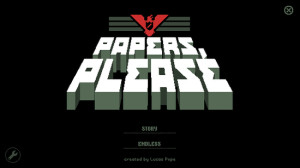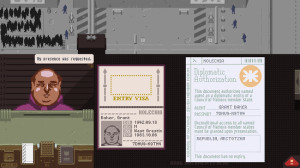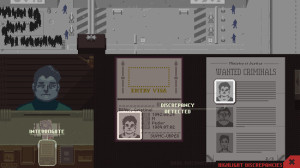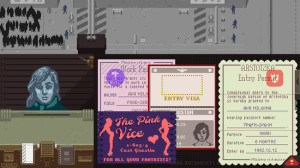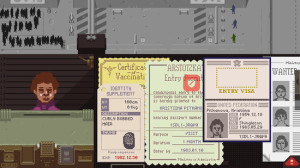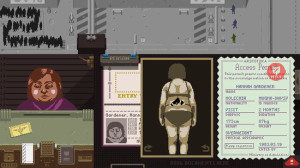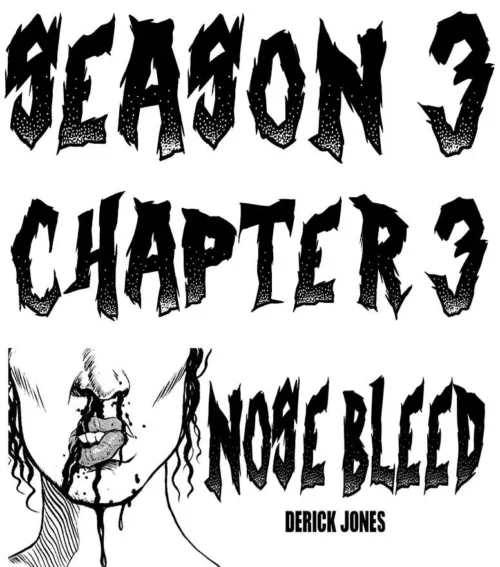(Maeve Griffin introduces us to a video game that pushes a player’s buttons and forces them to make decisions at a border crossing in Eastern Europe.–the Artblog editors)
If Kafka had made a video game instead of his novels, Papers, Please would be that game. “Papers, Please”, the newest game by Lucas Pope is described as a “dystopian document thriller.” In this starkly grim role-playing narrative you are a border control guard in the fictitious — and vaguely Eastern European-sounding — country of Arstotzka, and your job is to approve or deny peoples’ identity papers.
Approve or deny
You approve or deny based on whether paperwork is current and all the I.D. numbers and information match across the papers. It’s that simple. Until the world starts to pile on requirements like work permits, I.D. supplements, press documentation, forged governmental seals, and you begin to encounter asylum seekers, drug smugglers, bribes, and tons of out of date paperwork. Now if you mess up paperwork (or deliberately let people through because you feel sorry for them) you incur fines, and because your pay is so low, the fines may prevent you from buying food for your family or medicine for your sick son.
A conceptual game – the new frontier for art
I’m asking you to turn your attention to this game the way I would recommend a gallery or an installation because I feel that Papers, Please stands up to the same level of critique as something more traditionally artistic like a gallery show. As video games are growing into their awkward teenage years and experimenting with more sophisticated ideas and nuanced content, there is beginning to be fantastic content that fully exploits the opportunities of the medium. Papers, Please is an example of the sort of game that transcends its medium to become something bigger. The game works on many different levels but I mostly want to talk about the aesthetics, emotional impact, and ambiguity of meaning.
First up is the aesthetics: This game looks blunt, dull, and ugly. The entire game tries to capture the dour and soul-crushing monotony of being a tiny cog in an uncaring bureaucratic nightmare. This is fantastically captured in the drab flat colors and miserable faces of the unlucky people who have to cross the border. The low-resolution look of the game is successful (not only because of the aforementioned doom-gloom-utter-futility-of-life ambiance) because Papers, Please is also a period piece, and nothing says early 80’s Iron Curtain Eastern Euro gloom like pixilation and public-restroom-linoleum-grey-color.
Your emotional involvement
If I had to point to the single most engaging part of this game it would be the way you interact with the story. Papers, Please has twenty different endings that you can find based on your decisions. Basically the game puts you in tense moral situations that make you feel uncomfortable about yourself. For example, you think that there is no way you’d let someone involved in human trafficking through the border, even in a game, but what if not letting him through when all the paperwork checks out means that you’ll get a fine that prevents you from buying food? Do you let in the mother trying to be reunited with her son when her passport is expired? Do you help a mysterious hooded guy who pinky swears that he’s not a terrorist and threatens and bribes you? Do you take bribes? What if you’re taking bribes from other people in the government?
You will hit at least one point in this game where you will do something that makes you uncomfortable with yourself as you question what kind of decisions you would make if you were actually in this situation.
Ambiguity of the game’s message
Last and most important is the ambiguity of the message of the game. The game never gives you any easy answers about the choices you make and it’s impossible to know which choices you make are important. There is no clear political stance being taken in Papers, Please but it’s easy to see the game’s relevance to modern life particularly with ever more invasive TSA measures and tightening governmental controls on information in the name of the War On Terror. One of the most poignant moments of the game is when you receive instructions to search the possessions of all border crossers from one particular country. When you tell the people that they need to be searched to pass through you always tell them they have been selected for a “random search.” This is particularly disquieting since the practice is currently happening to people at borders in the United States — blatant profiling disguised as “random searches.”
For the price of an evening movie ticket you can sink into this compelling and poignant tale with many endings. If you are interested in experiencing something completely unique that truly showcases the potential of new interactive media do yourself a favor and pick up Lucas Pope’s “Papers, Please.”
A not on Lucas Pope — Pope was a developer for high budget productions like Uncharted: Drake’s Fortune and Uncharted 2: Among Thieves. He dropped out of the AAA production world to pursue more creative and experimental projects.
—Maeve Griffin is an illustrator, fine artist, and writer currently living in Philadelphia. www.maevegriffin.com


